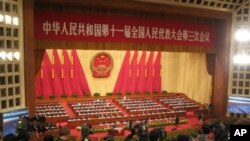China's legislature has begun its annual session Friday, with an emphasis on maintaining economic growth and increasing social and rural spending in an effort to help alleviate the problems brought on by growing income inequality.
In what has become an annual ritual, Chinese Premier Wen Jiabao opened the 10-day session of China's legislature, the National People's Congress.
In a lengthy work report to nearly 3,000 delegates from around the country, Mr. Wen outlined what the government has done and what it hopes to accomplish in the future.
Mr. Wen says improving people's well-being is the fundamental goal of economic development. He said making people's lives better will ensure sustained impetus for economic development, a solid foundation for social progress and lasting stability.
The country is facing a significant and growing wealth gap, and the Chinese government has worked to assure the poorer segments of society that they also will benefit from China's transformation. Economists blame income inequality for dampening domestic consumption.
To address this problem, Mr. Wen detailed increases in social and rural spending that are higher than the announced rise in this year's defense budget.
The government also is aware of the concerns of many Chinese people, who are worried about high housing prices, official corruption, land seizures and unemployment.
Mr. Wen called 2009 a difficult year for the Chinese economy because of the global economic crisis. Despite that, China saw a strong economic growth rate last year of 8.7 percent. He says China is targeting an economic growth rate this year of eight percent, which would put the country on course to replace Japan as the world's second largest economy after the United States.
On foreign affairs, the Chinese leader said his country will continue to play an international role.
He says China will continue to carry out diplomatic work in climate change and energy cooperation. He says China also will try to play a constructive role in finding what he described as "proper solutions" to hot issue and global problems.
China is at odds with the United States and Europe over climate change, whether to impose more sanctions on Iran because of its nuclear program and the Chinese currency, which critics say is kept low to give Beijing an unfair trade advantage.
This session of China's National People's Congress is set to end on March 14, when Prime Minister Wen takes questions from reporters in an annual news conference.
Chinese Legislative Session Opens With Focus on Improving People's Well-Being




